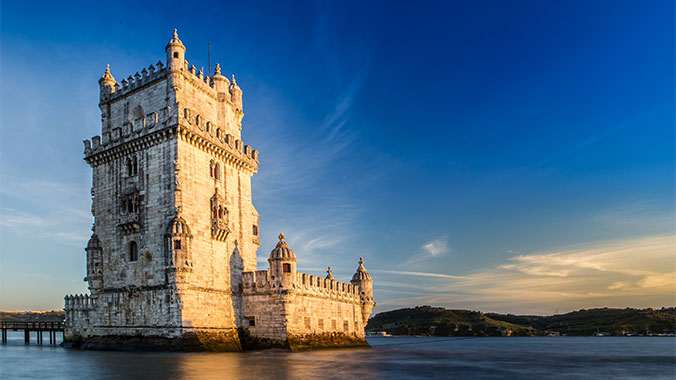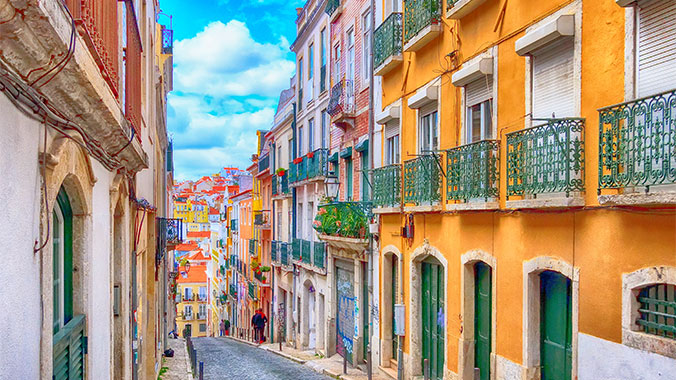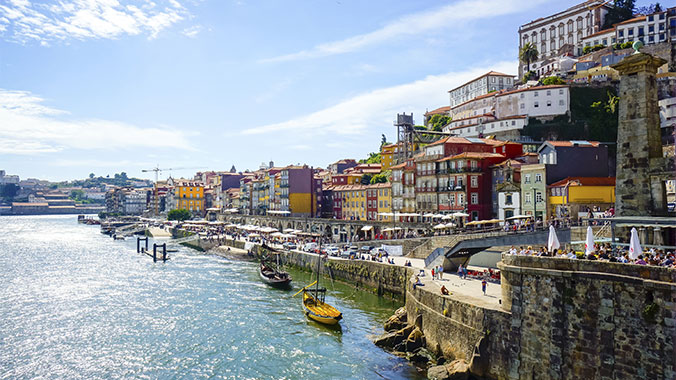Online Program
Adventures Online: The Best of Portugal From Lisbon to the Sea
Program No. 24188RJ
From the comfort of your home, discover the best of Portugal as you learn about its medieval history, its connection to the sea and the fascinating cities of Porto, Coimbra and Lisbon.
Enroll with Confidence
We want your Road Scholar learning adventure to be something to look forward to—not worry about. Learn more
Protecting the Environment
We offset a portion of the emissions created by your travel. Learn more
Itinerary
While we make every effort to ensure the accuracy of our published materials, programs are typically advertised more than a year prior to their start date.
Day
1
Introduction to Portugal, Lisbon & Belem
Location:
The comfort of your own home
Activity Note
All times noted are Eastern Time. Today’s session will begin at 11:00 a.m. and end at 3:30 p.m. Your program handouts are available online, located in your account on roadscholar.org. Once you’ve logged in to your Road Scholar account, click on Upcoming Online Programs and you’ll see an option to select this program. You should have received instructions to view these in your pre-program email.
Morning:
11:00 a.m. Our Group Leader and expert instructor will lead an Orientation and welcome meeting (60 minutes) with introductions.
Afternoon:
12:00 Noon. We’ll take a virtual stroll (45 minutes) through Belém, the section of Lisbon with the most significant buildings and monuments associated with Portugal’s golden age of discovery. We will start at the Tower of Belém, built in the early 16th century, that marks the entrance to Lisbon. It has become the symbol of the capital city. We will proceed to the Padrão dos Descobrimentos — Monument to the Discoveries — erected as a temporary exhibit for the 1940 Portuguese World Exhibition. It was rebuilt nearly two decades later as a permanent monument to honor the 500th anniversary of the death of Prince Henry “the Navigator.” More than 170 feet (52 meters) high, it represents the prow of a ship surmounted by the figures of 33 prominent figures of the time. We will end with a glimpse of the Mosteiro dos Jerónimos — Jerónimos Monastery — grand, ornately decorated in the unique Manueline style, and a UNESCO-designated World Heritage Site. Inside are the tombs of Portuguese kings; the country’s most important poet, Camões; and Vasco da Gama. 1:00 p.m. Break. 1:30 p.m. Lecture and field trip (60 minutes). , we will have an overview of Portugal, Lisbon, the Belém district, and learn about the “golden age” of Portuguese navigation that began in the 15th century and the discovery of the sea route to India led by Vasco da Gama. We will then have a virtual field trip to explore the Museu de Marinha — Maritime Museum — also known as the Navy Museum, and examine the evolution of Portuguese shipbuilding in this period. We will see models of ships of the time as well as scientific instruments that allowed daring voyages, and learn about the daily life of sailors.We’ll also have a question and answer (Q&A) session. 3:00 p.m. After a short break, we’ll engage in a Q&A session (30 minutes) focusing on how Portuguese people today see this period of their history. 3:30 p.m. Today’s online session ends.
Day
2
Fado, Coimbra, Universidade
Location:
The comfort of your own home
Activity Note
All times noted are Eastern Time. Today’s session will begin at 11:00 a.m. and end at 2:30 p.m. The day before each session, the instructor will remind the handouts needed and available online, located in your account on roadscholar.org. She will also recommend any extra reading or background research to complement the day’s themes.
Morning:
11:00 a.m. Fado music has been called the song of the Portuguese soul. In our next lecture (20 minutes), our instructor will introduce fado and Portuguese song, followed by a virtual live performance of Coimbra fado — a distinctive style that developed out of student groups at the famed university — followed by Q&A.
Afternoon:
12:30 p.m. Break. 1:00 p.m. Our next virtual field trip (50 minutes) will take us into the old city of Coimbra. This was the capital of Portugal and residence of numerous kings of the first dynasty. It also houses the Portugal’s oldest university. With a local expert, we will explore the old city and do what many students do: leave the train and walk uphill to the university that overlooks the Mondego river and valley. We will learn about the history of the city, what “republics” are, and see some of the most important monuments in town, before ending at the renowned Universidade de Coimbra that was founded in 1290. 2:30 p.m. Today’s online session ends.
Day
3
Portugal’s Geography & Art, Montemor o Velho, Delft Tiles
Location:
The comfort of your own home
Activity Note
All times noted are Eastern Time. Today’s session will begin at 11:00 a.m. and end at 3:15 p.m. The day before each session, the instructor will remind the handouts needed and available online, located in your account on roadscholar.org. She will also recommend any extra reading or background research to complement the day’s themes.
Morning:
11:00 a.m. Today’s lecture (60 minutes) will address how Portugal’s geographical position and many links with other continents shaped its art. Due to its position in relation to the rest of mainland Europe, artistic movements often took some time to reach Portugal. That same position also ensured that the Portuguese paid close attention to art and artefacts originating from Africa, Asia, and South America thanks to contacts established by great navigators and later by merchants, noblemen, and clergy.
Afternoon:
12:00 p.m. We will have a Q&A session (15 minutes). 12:20 p.m. Open discussion (30 minutes). 12:45 p.m. Break. 1:15 p.m. Our virtual field trip (30 minutes) will reveal Montemor o Velho, a rural municipality on the Mondego River, that derives its livelihood mostly from corn and rice production. Between Coimbra and Figueira da Foz is a huge castle on top of a hill. We will make a virtual stop to learn about its history and visit the local 16th century church that houses some significant art works such as a 14th century pregnant Madonna and 16th century tiles. We will also learn about the local tradition of “ex votos” offerings to saints. 2:00 p.m. We’ll have an expert-led virtual view of what may be the world’s largest collection of Delft tiles at the Casa do Paço in nearby Figueira da Foz. How these 6,700 Dutch tiles came to be here is something of a mystery. 2:30 p.m. We’ll engage an informal conversation (40 minutes) about Portugal with former students from Universidade de Coimbra. 3:15 p.m. Today’s online session ends.
Day
4
Present-day Portugal, The Coast, Sardinhada
Location:
The comfort of your own home
Activity Note
All times noted are Eastern Time. Today’s session will begin at 11:00 a.m. and end at 2:30 p.m. The day before each session, the instructor will remind the handouts needed and available online, located in your account on roadscholar.org. She will also recommend any extra reading or background research to complement the day’s themes.
Morning:
11:00 a.m. Lecture (60 minutes). Portugal has faced numerous challenges since 1910, starting with the change from monarchy to republic, seeing the rise of a dictatorship that would last for 48 years, the collapse of its African empire, and adapting to being a member of the European Union. We will analyze these changes and the huge impact they have had on society.
Afternoon:
12:00 p.m. Q&A session. 12:15 p.m. Break. 12:20 p.m. Lecture (30 minutes). Our instructor will discuss the importance of the sea for Portugal with a focus on modernity and tradition. 12:45 p.m. Break. 1:15 p.m. We will have a virtual “sardinhada-market-traineira” field trip (30 minutes) to see and learn how a sardine “barbecue” is prepared in a Portuguese home. 1:45 p.m. We will have an open discussion (30 minutes) on the “Mediterranean” diet and its benefits. Do new generations follow it? 2:30 p.m. Today’s online session ends.
Day
5
Porto Ribeira, Napoleonic Invasion, São Bento, Farewells
Location:
The comfort of your own home
Activity Note
All times noted are Eastern Time. Today’s session will begin at 11:00 a.m. and end at 1:00 p.m. The day before each session, the instructor will remind the handouts needed and available online, located in your account on roadscholar.org. She will also recommend any extra reading or background research to complement the day’s themes.
Morning:
11:00 a.m. We will set off on a virtual field trip (45 minutes) that will take us into Ribeira, the old section of Porto that developed in the medieval era. After crossing a 19th century bridge named for King Luis I, we will enter the neighborhood’s narrow streets with houses painted in bright colors or decorated with colorful tiles whose patterns indicated when they were made. In one of the city’s oldest squares, we will see the Praça do Cubo — Square of the Cube — a bronze sculpture that has become a focal point. We’ll than move over the 14th century wall to view the last city gate left from the old ramparts. We will also learn about the 1809 invasion by French troops and the death of hundreds of locals trying to escape from the French who died in the waters of the Douro River. Finally, we will go uphill to the railway station of São Bento with its incredible azulejos — beautiful Portuguese tiles that depict historical and other scenes. We will conclude at a downtown garden to admire the view. One of the finest port wines is produced just across the river in Vila Nova de Gaia. 11:45 a.m. Q&A.
Afternoon:
12:00 Noon. We’ll have a demonstration on how to prepare Porto Tonic, a popular libation that owes its existence to bars by the wine cellars in Vila Nova de Gaia. We’ll then have a wrap-up session and say farewells. 1:00 p.m. This concludes our program.




